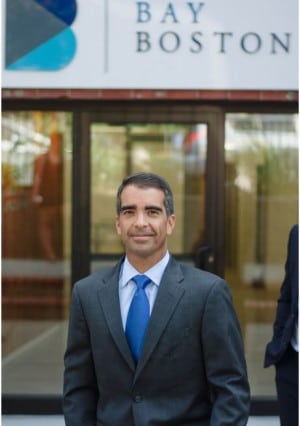Carlos Garcia
Title: Founder, CEO and Managing Partner, BayBoston
Age: 46
Experience: 25 years
Carlos Garcia always wanted to be an entrepreneur, so in 2013 he founded the private equity firm BayBoston, with the intent to invest in small- to medium-sized banks and financial services companies that don’t have access to readily available capital. The firm’s mission is to become a meaningful – but noncontrolling – investor, and work with the management team and majority shareholders to create value. Garcia brings a wealth of private and public experience in financial services: his resume includes stints as senior executive vice president of Santander Bank, president of Banco Santander Puerto Rico, vice chairman and CEO of Santander Securities, chairman of Santander Asset Management and board member of Santander Financial Services. Since its founding, BayBoston has looked at over 200 opportunities and invested in only four companies, scouring the market for highly selective opportunities that align with the company’s mission. Along with three other private equity firms, BayBoston in October 2015 acquired Boston-based Radius Bank. The firm likes the Massachusetts market and is always looking for good investment opportunities.
Q: Is it common to see private equity invest in community banks, or is this new?
A: There was some presence of private equity prior to the financial crisis. After the financial crisis, I think there has been more investors that have dedicated themselves to investing in banking. In the U.S., there are still 5,800 banks, which is a very sizable number. It used to be over 15,000 20 years ago, and there has been some consolidation. But there are many good banks in different communities. Banks, as they continue to grow, need more capital to sustain required capital ratios. We are a willing and able provider of that capital when we see alignment with the bank’s principles, business plans and management teams.
Q: What qualities do you look for when investing in a community or regional bank?
A: We follow a combination of seven qualitative and quantitative principles that guide us. One of the most critical factors is we like to be in population centers where there is a lot of competition for banking services. Second, we try to invest in companies that do not have regulatory or asset quality issues. But even deeper, we work very closely in understanding the motivations of the management team, and the goals of the bank and that community. We look at the bank’s disciplined in the way they price deposits and loans. What is their ability to be able to hire teams to expand? We look at whether the company has scalability with their current set up of processes and IT infrastructure. Then we assess whether their business plan can be successfully deployed.
Q: What was your thinking behind the investment in Radius Bank?
A: We love the New England market, and we love the Massachusetts market; it’s a very competitive landscape with great customers. Radius to us was a very unique opportunity. We thought they had an outstanding management team. They have a different strategy from your typical bank in Massachusetts because they have built a platform to be able to capture deposits on a national basis and they have done that very successfully by providing all services that a digital customer will be looking for in a very efficient way. They have a very unique marketing strategy and we think there is great space for growth when you have a very unique team of people that are very qualified, with a well thought out platform and a good plan. We have been pleased with that investment, and we look forward to Radius continuing to grow and be successful. Radius is a benchmark of what a community bank can do in the digital space in a successful way.
Q: What can we expect to see in Massachusetts in terms of consolidation, acquisitions and IPOs?
A: We see consolidation as a constant. On a local context, you are seeing an acquisition of five to six institutions a year, and in Massachusetts we are at about 128 institutions. There has been a lot said that banking consolidation is accelerating, but I think it is following a natural path. When organizations get to a certain point, for many different reasons, they require either to be consolidated or to be a consolidator. The most important thing in banking is the value of core deposits.
People always think about loans, but at the core of every bank, it’s the value of stable core deposits. This is why community banks can do better than larger banks due to their community roots. Because of where interest rates have been for a long time, the perception of core deposits has not yet been seen on right perspective. We believe if rates continue to increase, that value of core deposits will rise. The sum of Massachusetts having over 120 banks, and there being more than 5,800 banks nationally – all with a great need for core deposits – we believe that creates great excitement in this industry and will create a lot of value along that process.
Garcia’s Top Five Tips For Bank Investments:
- Community banks understand better the needs of their customers, and good community banks get rewarded by customer loyalty.
- The value of a bank is in the stickiness of its core deposits and the credit quality of its loan portfolio.
- Technology is enabling smaller banks to effectively compete with larger banks.
- There is intrinsic value that can be unleashed by providing a stable source of capital to community banks so they can grow.
- Bank investments are a great way to cash in on thriving local and regional economies.




 |
| 


